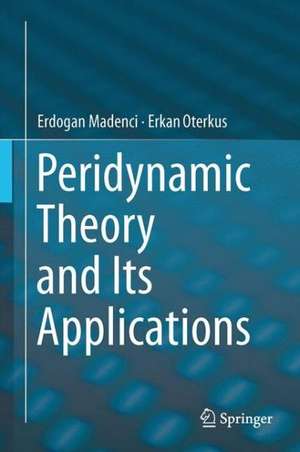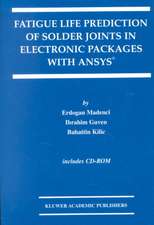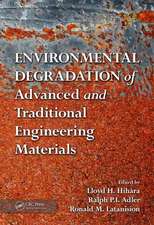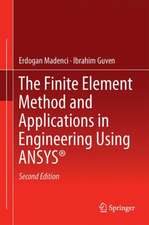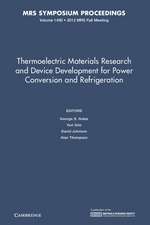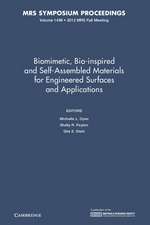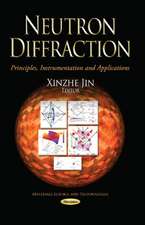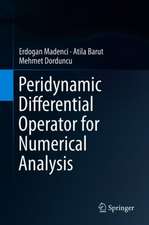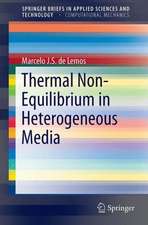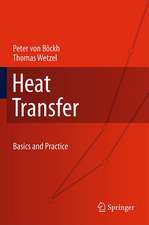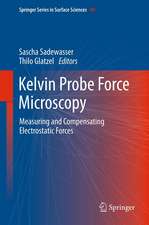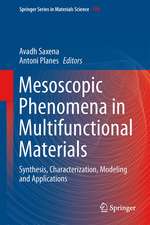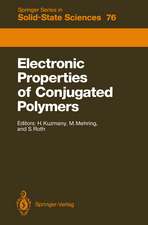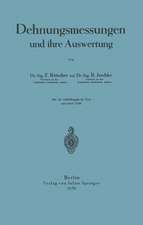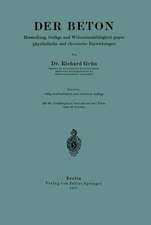Peridynamic Theory and Its Applications
Autor Erdogan Madenci, Erkan Oterkusen Limba Engleză Hardback – 22 oct 2013
| Toate formatele și edițiile | Preț | Express |
|---|---|---|
| Paperback (1) | 488.12 lei 6-8 săpt. | |
| Springer – 23 aug 2016 | 488.12 lei 6-8 săpt. | |
| Hardback (1) | 647.08 lei 6-8 săpt. | |
| Springer – 22 oct 2013 | 647.08 lei 6-8 săpt. |
Preț: 647.08 lei
Preț vechi: 761.27 lei
-15% Nou
Puncte Express: 971
Preț estimativ în valută:
123.84€ • 128.81$ • 102.23£
123.84€ • 128.81$ • 102.23£
Carte tipărită la comandă
Livrare economică 15-29 aprilie
Preluare comenzi: 021 569.72.76
Specificații
ISBN-13: 9781461484646
ISBN-10: 1461484642
Pagini: 304
Ilustrații: XII, 289 p. 152 illus.
Dimensiuni: 155 x 235 x 22 mm
Greutate: 0.6 kg
Ediția:2014
Editura: Springer
Colecția Springer
Locul publicării:New York, NY, United States
ISBN-10: 1461484642
Pagini: 304
Ilustrații: XII, 289 p. 152 illus.
Dimensiuni: 155 x 235 x 22 mm
Greutate: 0.6 kg
Ediția:2014
Editura: Springer
Colecția Springer
Locul publicării:New York, NY, United States
Public țintă
GraduateCuprins
Introduction.- Peridynamic Theory.- Peridynamics for Local Interactions.- Peridynamics for Isotropic Materials.- Peridynamics for Laminated Composite Materials.- Damage Prediction.- Numerical Solution Methods.- Benchmark Problems.- Nonimpact Problems.- Impact Problems.- Coupling of the Peridynamic Theory and Finite Element Methods.- Peridynamic Thermal Diffusion.- Fully Coupled Peridynamic Thermomechanics.
Recenzii
From the book reviews:
“The book is very interesting from the methodical viewpoint, presenting a comparatively new theory of solid mechanics, accompanying the text by many examples, which can be useful to students studying the novel approaches to solid mechanics and related topics, and also to their teachers preparing lectures and practical works.” (I. A. Parinov, zbMATH, Vol. 1295, 2014)
“The book is very interesting from the methodical viewpoint, presenting a comparatively new theory of solid mechanics, accompanying the text by many examples, which can be useful to students studying the novel approaches to solid mechanics and related topics, and also to their teachers preparing lectures and practical works.” (I. A. Parinov, zbMATH, Vol. 1295, 2014)
Textul de pe ultima copertă
The peridynamic theory provides the capability for improved modeling of progressive failure in materials and structures, paving the way to address multi-physics and multi-scale problems. Because it is based on concepts not commonly used in the past, the purpose of this book is to explain the peridynamic theory in a single framework. It presents not only the theoretical basis but also its numerical implementation.
The book begins with an overview of the peridynamic theory and derivation of its governing equations. The relationship between peridynamics and classical continuum mechanics is established, and this leads to the ordinary state-based peridynamics formulations for both isotropic and composite materials. Numerical treatments of the peridynamic equations are presented in detail along with solutions to many benchmark and demonstration problems. In order to take advantage of salient features of peridynamics and the finite element method, a coupling technique is also described. Finally, an extension of the peridynamic theory for thermal diffusion and fully coupled thermomechanics is presented with applications.
Students and researchers alike will find this book an essential and invaluable reference on the topic. It offers both theoretical and practical knowledge of the peridynamic theory and may be used in courses such as Multi-physics and Multi-scale Analysis, Nonlocal Computational Mechanics, and Computational Damage Prediction. Sample algorithms for the solution of benchmark problems are available at http://extras.springer.com for researchers and graduate students, who can modify these algorithms and develop their own solution algorithms for specific problems.
The book begins with an overview of the peridynamic theory and derivation of its governing equations. The relationship between peridynamics and classical continuum mechanics is established, and this leads to the ordinary state-based peridynamics formulations for both isotropic and composite materials. Numerical treatments of the peridynamic equations are presented in detail along with solutions to many benchmark and demonstration problems. In order to take advantage of salient features of peridynamics and the finite element method, a coupling technique is also described. Finally, an extension of the peridynamic theory for thermal diffusion and fully coupled thermomechanics is presented with applications.
Students and researchers alike will find this book an essential and invaluable reference on the topic. It offers both theoretical and practical knowledge of the peridynamic theory and may be used in courses such as Multi-physics and Multi-scale Analysis, Nonlocal Computational Mechanics, and Computational Damage Prediction. Sample algorithms for the solution of benchmark problems are available at http://extras.springer.com for researchers and graduate students, who can modify these algorithms and develop their own solution algorithms for specific problems.
Caracteristici
Introduces a new theory to advance in the analysis of existing and new structures and materials Provides sample algorithms for students, as well as researchers, to self-study and discover their own solutions to problems Provides a comprehensive introduction to this emerging method and is suitable for graduate courses Includes supplementary material: sn.pub/extras
